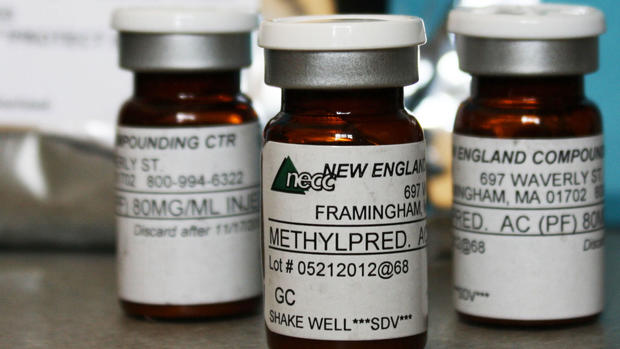FDA emphasizes compounding facilities need to be regulated
SILVER SPRING, Md The head of the Food and Drug Administration renewed her push Wednesday for new laws to help police pharmacies like the one that triggered a deadly meningitis outbreak, even as members of Congress expressed little interest in cooperating with the agency.
FDA Commissioner Margaret Hamburg met with state pharmacy regulators at a meeting to discuss the oversight of compounding pharmacies like the New England Compounding Center, the company which triggered a now 3-month-old outbreak of rare fungal meningitis.
Contaminated injections from the Framingham, Mass.-based company have been blamed for 39 deaths and 620 illnesses, according to the Centers for Disease Control and Prevention. About 370 of the cases were caused by a rare form of fungal meningitis, which causes inflammation on the lining of the brain and spinal cord.
- More than 50 lawsuits filed in meningitis outbreak
- CDC reports increase in non-meningitis infections tied to outbreak
- Pharmacy head pleads Fifth at meningitis outbreak hearing
Hamburg said federal and state health inspectors need to work together more closely to oversee compounding pharmacies, which fall into a legal gray area between various state and federal laws.
"We can do the most effective work when we do it in partnership," Hamburg told the heads of 50 state pharmacy boards, gathered at the FDA's headquarters. "This is a shared responsibility and the states are obviously on the front line of this issue."
Compounding pharmacies, which mix customized medications based on doctors' prescriptions, have traditionally been overseen by state pharmacy boards, many which date back to the 19th century. The FDA mainly oversees multinational pharmaceutical manufacturing companies like Pfizer Inc. and Merck & Co. In the last two decades, the agency has begun scrutinizing larger compounders like the NECC, which mass-produce thousands of vials of drugs that can be shipped nationwide.
The FDA says new laws are needed to regulate these so-called "nontraditional" compounding pharmacies. Hamburg has proposed a new system under which nontraditional pharmacies would have to register with the FDA and undergo regular inspections, similar to pharmaceutical manufacturers. Small compounding pharmacies would continue to be regulated by state pharmacy boards.
Hamburg told reporters at the meeting she was "guardedly optimistic" that Congress would pass the requested legislation.
But House Republicans on Wednesday signaled little interest in moving ahead on the issue, accusing the agency of dragging its feet in cooperating with their investigation into FDA's oversight of NECC. At a congressional hearing on the outbreak last month, many Republicans said the FDA had multiple chances to shut down the pharmacy and requested internal agency memos on the matter.
"More than a month later, the FDA still has not produced its internal communications and documents related to NECC," said Rep. Fred Upton, R-Mich., who chairs the House Energy and Commerce Committee. "Without this information, we are unable to identify any possible weaknesses and as a result, the necessary corrections."
An agency spokeswoman said the FDA is working to respond to the committee, and has turned over nearly 4,000 pages of documents to congressional lawmakers.
While the FDA's proposal has idled in Congress it has also attracted criticism from consumer safety advocates - who typically favor more regulation.
The health safety group Public Citizen argued that the FDA already has the authority to shut down operations like the NECC, since the pharmacy had clearly crossed the line from mixing prescriptions to manufacturing drugs. In a letter released Tuesday, the group said that the new laws sought by the FDA would actually do more harm by legitimizing the activities of rogue pharmacies like the NECC.
"This proposal, if implemented, would validate the FDA's current lax enforcement practices for drug manufacturing conducted under the guise of pharmacy compounding," the group states in a letter to Health and Human Services Secretary Kathleen Sebelius.
Also on Wednesday, health officials released new details about the outbreak investigation.
In an article published by the New England Journal of Medicine, officials discussed how illnesses were tied to three lots of the steroid - methylprednisolone acetate - made at New England Compounding. The first lot was made in May and included about 6,500 vials. A second, of nearly 6,300 was, produced in June. The third, of 4,900 vials, was made in August.
Well over half of the cases of meningitis and other fungal infections were tied to the June lot, investigators said in the article.
The same finding applied to deaths, according to additional information released this week by the Centers for Disease Control and Prevention. Nearly two-thirds of the deaths were in people who received shots from the June lot.
It's not clear why deaths and illnesses were so much more common in patients who got the June doses, said Dr. Benjamin Park, head of the CDC team that investigates fungal diseases.
The CDC said the first death from the outbreak occurred in Florida in July. The 38 other known deaths occurred in September or afterward, including two this month.
Things could have been much worse. In some earlier fungal meningitis outbreaks, as many as 40 percent of the people who grew sick ultimately died. In this outbreak, 6 percent died.
CDC officials believe some lives were probably saved because health officials and health workers teamed up to quickly contact nearly everyone who got a shot from the tainted lots, and start treating those with worrisome symptoms.
Now it's been three months since the outbreak was first recognized, and new meningitis cases have become increasingly rare. But it's possible some cases may still develop. Meanwhile, health officials continue to discover a steady number of new cases of other types of fungal infections, including potentially dangerous pus pockets forming at the spine of some of the steroid patients.
Health officials believe there are more patients who need to undergo MRI scans to detect infections.
"It's not over yet," Park said.
